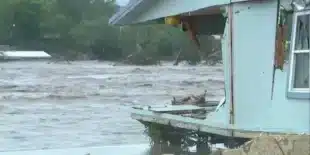On Wednesday, the United States, France, and other allies called for an urgent 21-day ceasefire between Israel and Hezbollah. This appeal, crafted during discussions at the U.N. General Assembly in New York, aims to halt the recent violence that has claimed over 600 lives in Lebanon. The joint statement described the ongoing conflict as intolerable and warned of the risk it poses for broader regional escalation.
The call for a ceasefire seeks to create a window for diplomatic negotiations, urging all involved parties, including the governments of Israel and Lebanon, to agree to the ceasefire without delay. Despite the appeal, there was no immediate response from the Israeli or Lebanese governments or from Hezbollah.
Senior U.S. officials, who spoke on condition of anonymity, mentioned that while Hezbollah itself wouldn’t sign the ceasefire, they anticipate that the Lebanese government would agree to it in coordination with Hezbollah. These officials also expect a positive reception from Israel, particularly when Israeli Prime Minister Benjamin Netanyahu addresses the General Assembly.
This ceasefire initiative is part of broader efforts to stabilize the region, which has seen months of escalating exchanges of fire, displacing tens of thousands and stoking fears of a larger conflict. The proposal also aims to rejuvenate stalled talks for a ceasefire and hostage release between Israel and Hamas, indicating a complex intertwining of regional conflicts.
The ceasefire proposal was a result of rapid diplomatic efforts led by President Joe Biden’s security team, including Secretary of State Antony Blinken and National Security Advisor Jake Sullivan. These efforts included securing endorsements from various global leaders and aligning international support for a pause in fighting, which could potentially lead to more permanent solutions.
Notably, French Foreign Minister Jean-Noël Barrot and Lebanese Prime Minister Najib Mikati have publicly supported the ceasefire, urging quick acceptance to prevent further escalation. Conversely, Israel’s U.N. Ambassador, Danny Danon, expressed a preference for a ceasefire to facilitate the return of residents near the border, emphasizing that Israel does not desire a full-scale war.
The Security Council resolution that ended the 2006 war between Israel and Hezbollah was also reaffirmed by both Danon and Mikati. This resolution, which has not been fully implemented, includes provisions for a cessation of hostilities and the disarmament of armed groups in Lebanon, including Hezbollah.
President Biden, speaking on “The View,” mentioned that while an all-out war remains a possibility, there is also a chance for a significant diplomatic resolution that could transform the regional dynamics, underscoring his administration’s commitment to finding a peaceful solution.
Additionally, the U.S. has intensified its pressure on entities supporting Hezbollah through sanctions targeting illicit Iranian petroleum shipments, demonstrating the multifaceted approach the U.S. is employing to address the complex issues in the Middle East.


